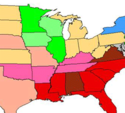In an upcoming study I am working on with Chapman University’s Center for Demographics and Policy, we show that San Francisco and Houston are North America’s “emerging” global cities. They are also rival representative champions and exemplars of two models of civic development. San Francisco is the world’s technology capital; focused on the highest levels of the economic food chain; paragon of the new, intangible economy; and promoter environmental values and compact development. Houston is the closest thing to American laissez-faire; unabashed embracer of the old economy of tangible stuff, including unfashionable, but highly profitable, industries like oil, chemicals, and shipping. read more »
Build It, Even Though They Won't Come
The recent decision by Los Angeles County Superior Court Judge Allan J. Goodman to reject as “fatally flawed” the densification plans for downtown Hollywood could shake the foundations of California's “smart growth” planning clerisy. By dismissing Los Angeles' Hollywood plan, the judge also assaulted the logic behind plans throughout the region to construct substantial high-rise development in “transit-oriented developments” adjacent to rail stations. read more »
The New Geography of Apartment Rentals
“Supply and demand” describes the interaction between the available amount of a resource and the need for it by consumers. In the world of community development, nowhere is this dynamic more pronounced than in the rental housing market. read more »
- Login to post comments
How Silicon Valley Could Destabilize The Democratic Party
Much has been written, often with considerable glee, about the worsening divide in the Republican Party between its corporate and Tea Party wings. Yet Democrats may soon face their own schism as a result of the growing power in the party of high-tech business interests. read more »
Highway Eye-4, Revisited
Interstate 4. It is a unique highway which is cursed by many drivers in Central Florida, and many more who come here in search of rest and relaxation. While Californians raise all highways to royal status — Interstate 5, for one, is referred to as "the five", as if it were some kind of important personage — Floridians just call their central artery I-four. My decision to chronicle I-4 was sparked by a recent experience. Along with my family, I was caught in a traffic jam as we headed east on I-4 outside of Disney World. I have been stuck on this very spot many times. read more »
The Evolving Urban Form: Charlotte
There may be no better example of the post World War II urban form than Charlotte, North Carolina (a metropolitan area and urban area that stretches into South Carolina). Indeed, among the approximately 470 urban areas with more than 1 million population, Charlotte ranks last in urban population density in the United States (Figure 1) and last in the world. According to the United States Census Bureau, Charlotte's built-up urban area population density was 1685 per square mile (650 per square kilometer) in 2010. read more »
Some Implications of Detroit’s Bankruptcy
There’s been so much ink spilled over Detroit’s bankruptcy that I haven’t felt the need to add much to it. But this week the judge overseeing the case ruled that the city of Detroit is eligible for bankruptcy. He also went ahead and ruled that pensions can be cut for the city’s retirees. Meanwhile, the city has received an appraisal of less than $2 billion for the most famous paintings in the Detroit Institute of the Arts.
A couple of thoughts on this: read more »
Political, Economic Power Grow More Concentrated
Generally speaking, we associate the quest for central government control to be very much a product of the extremes of left and right. But increasingly, the lobby for ever-greater concentration of power – both economically and politically – comes not from the fringes, but from established centers of both parties and media power.
Recently, for example, an article by Francis Fukuyama, a conservative-leaning intellectual, called for greater consolidation of federal power, most particularly, the Executive Branch. Ironically, Fukuyama's call for greater central power follows a line most often adopted by “progressive” Democrats, who seek to use federal power to enforce their views on a host of environmental, economic and social issues even on reluctant parts of the country. read more »
The Abuse of Art in Economic Development
City building is an imperfect process. Poverty, segregation, and income disparities persist, or worsen, despite longstanding efforts to affect change. The unsightliness of these social failures are called “blight”. Blight is commonly thought to be the antithesis to beauty. read more »
The Geography of Cultural Attitudes
The cultural and political division of America, the gap between “red” and ”blue” with respect to economic and social liberalism or conservatism is a constant and dominant theme in American discourse. Here’s some narrowly specific measures of social liberalism based on actual votes by citizens or legislatures, not polls or broader indices available. read more »
- Login to post comments





















